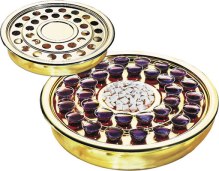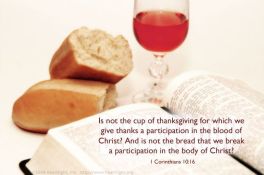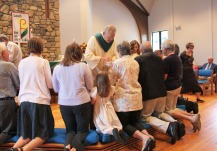I feel compelled this morning to share some thoughts about Maundy Thursday.
(This is a quick word before we dive into our series on Understanding Lutheran Worship next week.)
 I was introduced to Jesus in a Restoration Movement (non-denominational) church that was committed to the weekly practice Communion (a.k.a. “Lord’s Supper”, or “the Eucharist”). I was a point of pride for us back in the day. The Bible seems to indicate that weekly Communion was the practice of the early church (Acts 20:7). And if there’s one thing my first church was, it was committed to being literally Biblical. (I’m grateful to that heritage to this day.)
I was introduced to Jesus in a Restoration Movement (non-denominational) church that was committed to the weekly practice Communion (a.k.a. “Lord’s Supper”, or “the Eucharist”). I was a point of pride for us back in the day. The Bible seems to indicate that weekly Communion was the practice of the early church (Acts 20:7). And if there’s one thing my first church was, it was committed to being literally Biblical. (I’m grateful to that heritage to this day.)
What was never explained to me, though, was why it was important. It was a nice reminder of Jesus, of course. And, like Baptism, I was compliant with the Biblical charge to do this (what those Catholics call) “sacrament” because the Bible says to. But, it was explained to me that nothing really happens during these practices. They served as physical testimonies of historic realities: Communion, the crucifixion … and Baptism, my decision to follow Jesus.
 As I became a student and teacher of theology, I came to realize that my little church’s understanding of the sacraments was not in line with that of the first 1,500 years of the historical church. It was universally understood, from the time of Christ to the age of the Enlightenment, that these Christ-ordained rites were “efficacious” … a good theological word meaning “something happens!” More than just reminders of past events, they are present, real encounters with God. “Means of grace.”
As I became a student and teacher of theology, I came to realize that my little church’s understanding of the sacraments was not in line with that of the first 1,500 years of the historical church. It was universally understood, from the time of Christ to the age of the Enlightenment, that these Christ-ordained rites were “efficacious” … a good theological word meaning “something happens!” More than just reminders of past events, they are present, real encounters with God. “Means of grace.”
 This jibed with my Bible reading. From Jesus’ baptism on, every time there is a baptism recorded in the scriptures, something dramatic happened. Then I read where Paul asked the Corinthians, “The cup of blessing that we bless, is it not a participation in the blood of Christ? The bread that we break, is it not a participation in the body of Christ?”, and then went on to say that “he who eats and drinks in an unworthy manner eats and drinks judgment to himself, not discerning the Lord’s body. For this reason many are weak and sick among you, and many sleep (e.g., have died!). These are more than remembrances. Spiritual power is manifesting itself through these prescribed rites.
This jibed with my Bible reading. From Jesus’ baptism on, every time there is a baptism recorded in the scriptures, something dramatic happened. Then I read where Paul asked the Corinthians, “The cup of blessing that we bless, is it not a participation in the blood of Christ? The bread that we break, is it not a participation in the body of Christ?”, and then went on to say that “he who eats and drinks in an unworthy manner eats and drinks judgment to himself, not discerning the Lord’s body. For this reason many are weak and sick among you, and many sleep (e.g., have died!). These are more than remembrances. Spiritual power is manifesting itself through these prescribed rites.
As I brought up these topics with my teachers, they insisted that these were not supernatural events. They also told me that the sign-gifts of the Holy Spirit are not in operation anymore. They also told me that God is only doing miracles in far-off places around the world … because they need the miracles, and we don’t, because we can understand the text of the Bible. I came to realize that, like the Liberal Theology churches they were quick to condemn, my post-Enlightenment Evangelical brothers and sisters had dispensed with God manifesting Himself in the physical. He was to be found only in the head-study of the scriptures, with an occasional warm fuzzy at a weekend retreat, and the feeling of assurance produced by good works. And that should be all I need, if I’m a strong Christian.
 Fast forward to 2013: After a 28-year pastoral career in the Evangelical tradition, I finally changed my ecclesiastical “relationship status”. I became a member of a classical faith denomination that embraces the historical understanding of (many things, but for the purposes of this post) the sacraments. I believe, am in line with generations that have believed, am led by those who believe, and am surrounded by a church which believes, that:
Fast forward to 2013: After a 28-year pastoral career in the Evangelical tradition, I finally changed my ecclesiastical “relationship status”. I became a member of a classical faith denomination that embraces the historical understanding of (many things, but for the purposes of this post) the sacraments. I believe, am in line with generations that have believed, am led by those who believe, and am surrounded by a church which believes, that:
- The cup of blessing is it a participation in the blood of Christ, and the bread we break is a participation in the body of Christ.
- When Jesus instituted the Lord’s Supper by saying, “this is my body” and “this is my blood”, he instituted a real participation with his real body and real blood for His church into the future.
- The sacraments “require faith; for without faith they would not be apprehended”*, so it is our shared faith through which the fulness of the efficacious, sacramental reality is experienced.
Maundy Thursday used to be a nice day to remember a touching evening … the night Jesus set up an ongoing reminder of what He was going to do the next day. But now, I  realize it is so much more: It was God, in Christ, preparing for us a table in our ongoing wilderness wandering on earth. It is our ongoing source of participation in and with the very presence of Christ. It is the Word of God, not just a mental idea, but made flesh, dwelling among us. It is where I eat the flesh and drink the blood of Jesus, and thereby have life (Jn. 6:63). It is my actual experience of Jesus promise to be with us unto the end of the age (Matt. 28:20).
realize it is so much more: It was God, in Christ, preparing for us a table in our ongoing wilderness wandering on earth. It is our ongoing source of participation in and with the very presence of Christ. It is the Word of God, not just a mental idea, but made flesh, dwelling among us. It is where I eat the flesh and drink the blood of Jesus, and thereby have life (Jn. 6:63). It is my actual experience of Jesus promise to be with us unto the end of the age (Matt. 28:20).
To think I lived without this means of grace for decades. My prayer is that many from my original tribe will also be made aware of these incredible graces of our Lord, and embrace them by faith.
– Bill Hartley